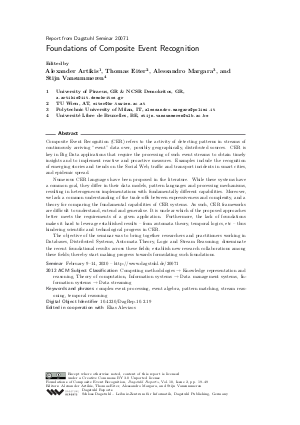Foundations of Composite Event Recognition (Dagstuhl Seminar 20071)
Authors Alexander Artikis, Thomas Eiter, Alessandro Margara, Stijn Vansummeren and all authors of the abstracts in this report
-
Part of:
Issue:
Dagstuhl Reports, Volume 10, Issue 2
Part of: Volume: Dagstuhl Reports, Volume 10
Part of: Journal: Dagstuhl Reports (DagRep) - License:
 Creative Commons Attribution 3.0 Unported license
Creative Commons Attribution 3.0 Unported license
- Publication Date: 2020-09-17
File

PDF
DagRep.10.2.19.pdf
- Filesize: 10.2 MB
- 31 pages
Document Identifiers
Subject Classification
ACM Subject Classification
- Computing methodologies → Knowledge representation and reasoning
- Theory of computation
- Information systems → Data management systems
- Information systems → Data streaming
Keywords
- complex event processing
- event algebra
- pattern matching
- stream reasoning
- temporal reasoning
Metrics
- Access Statistics
-
Total Accesses (updated on a weekly basis)
0Document
0Metadata
Abstract
Composite Event Recognition (CER) refers to the activity of detecting patterns in streams of continuously arriving "event" data over, possibly geographically, distributed sources. CER is key in Big Data applications that require the processing of such event streams to obtain timely insights and to implement reactive and proactive measures. Examples include the recognition of emerging stories and trends on the Social Web, traffic and transport incidents in smart cities, and epidemic spread. Numerous CER languages have been proposed in the literature. While these systems have a common goal, they differ in their data models, pattern languages and processing mechanisms, resulting in heterogeneous implementations with fundamentally different capabilities. Moreover, we lack a common understanding of the trade-offs between expressiveness and complexity, and a theory for comparing the fundamental capabilities of CER systems. As such, CER frameworks are difficult to understand, extend and generalise. It is unclear which of the proposed approaches better meets the requirements of a given application. Furthermore, the lack of foundations makes it hard to leverage established results - from automata theory, temporal logics, etc - thus hindering scientific and technological progress in CER. The objective of the seminar was to bring together researchers and practitioners working in Databases, Distributed Systems, Automata Theory, Logic and Stream Reasoning; disseminate the recent foundational results across these fields; establish new research collaborations among these fields; thereby start making progress towards formulating such foundations.
Cite As Get BibTex
Alexander Artikis, Thomas Eiter, Alessandro Margara, and Stijn Vansummeren. Foundations of Composite Event Recognition (Dagstuhl Seminar 20071). In Dagstuhl Reports, Volume 10, Issue 2, pp. 19-49, Schloss Dagstuhl – Leibniz-Zentrum für Informatik (2020)
https://doi.org/10.4230/DagRep.10.2.19
BibTex
@Article{artikis_et_al:DagRep.10.2.19,
author = {Artikis, Alexander and Eiter, Thomas and Margara, Alessandro and Vansummeren, Stijn},
title = {{Foundations of Composite Event Recognition (Dagstuhl Seminar 20071)}},
pages = {19--49},
journal = {Dagstuhl Reports},
ISSN = {2192-5283},
year = {2020},
volume = {10},
number = {2},
editor = {Artikis, Alexander and Eiter, Thomas and Margara, Alessandro and Vansummeren, Stijn},
publisher = {Schloss Dagstuhl -- Leibniz-Zentrum f{\"u}r Informatik},
address = {Dagstuhl, Germany},
URL = {https://drops.dagstuhl.de/entities/document/10.4230/DagRep.10.2.19},
URN = {urn:nbn:de:0030-drops-130587},
doi = {10.4230/DagRep.10.2.19},
annote = {Keywords: complex event processing, event algebra, pattern matching, stream reasoning, temporal reasoning}
}
